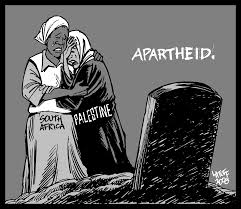
The Human Sciences Research Council of South Africa (HSRC) has released a report confirming that Israel is practicing both colonialism and apartheid in the Occupied Palestinian Territories (OPT).
The HSRC commissioned an international team of scholars and practitioners of international public law from South Africa, the United Kingdom, Israel and the West Bank to conduct this study. The resulting 300-page report, titled "Occupation, Colonialism, Apartheid?: A re-assessment of Israel's practices in the occupied Palestinian territories under international law," represents 15 months of research and constitutes an exhaustive review of Israel's practices in the OPT according to definitions of colonialism and apartheid provided by international law. The project was suggested originally by the January 2007 report by eminent South African jurist John Dugard, in his capacity as Special Rapporteur to the United Nations Human Rights Council, when he indicated that Israeli practices had assumed characteristics of colonialism and apartheid.
Regarding colonialism, the team found that Israel's policy and practices violate the prohibition on colonialism which the international community developed in the 1960s in response to the great decolonization struggles in Africa and Asia. Israel's policy is demonstrably to fragment the West Bank and annex part of it permanently to Israel, which is the hallmark of colonialism. Israel has appropriated land and water in the OPT, merged the Palestinian economy with Israel's economy, and imposed a system of domination over Palestinians to ensure their subjugation to these measures. Through these measures, Israel has denied the indigenous population the right to self-determination and indicated clear intention to assume sovereignty over portions of its land and natural resources. Permanent annexation of territory in this fashion is the hallmark of colonialism.
Regarding apartheid, the team found that Israel's laws and policies in the OPT fit the definition of apartheid in the International Convention on the Suppression and Punishment of the Crime of Apartheid. Israeli law conveys privileges to Jewish settlers and disadvantages Palestinians in the same territory on the basis of their respective identities, which function in this case as racialized identities in the sense provided by international law. Israel's practices are corollary to five of the six "inhuman acts" listed by the Convention. A policy of apartheid is especially indicated by Israel's demarcation of geographic "reserves" in the West Bank, to which Palestinian residence is confined and which Palestinians cannot leave without a permit. The system is very similar to the policy of "Grand Apartheid" in Apartheid South Africa, in which black South Africans were confined to black Homelands delineated by the South African government, while white South Africans enjoyed freedom of movement and full civil rights in the rest of the country.
Wednesday, June 10, 2009
"Occupation, Colonialism, Apartheid?: A re-assessment of Israel's practices in the occupied Palestinian territories under international law.
The full report here ( 3 Mb Pdf)
Subscribe to:
Post Comments (Atom)





No comments:
Post a Comment